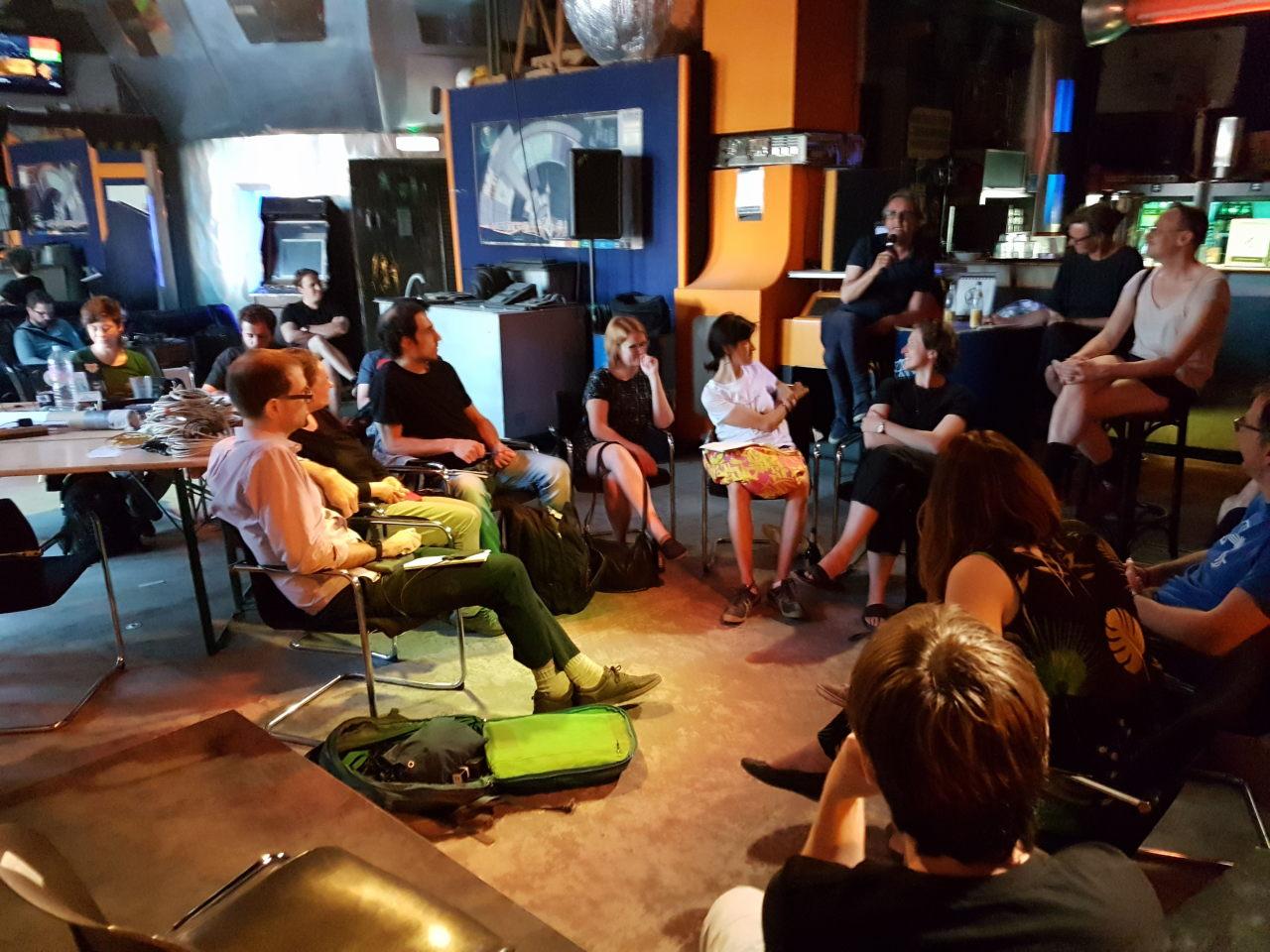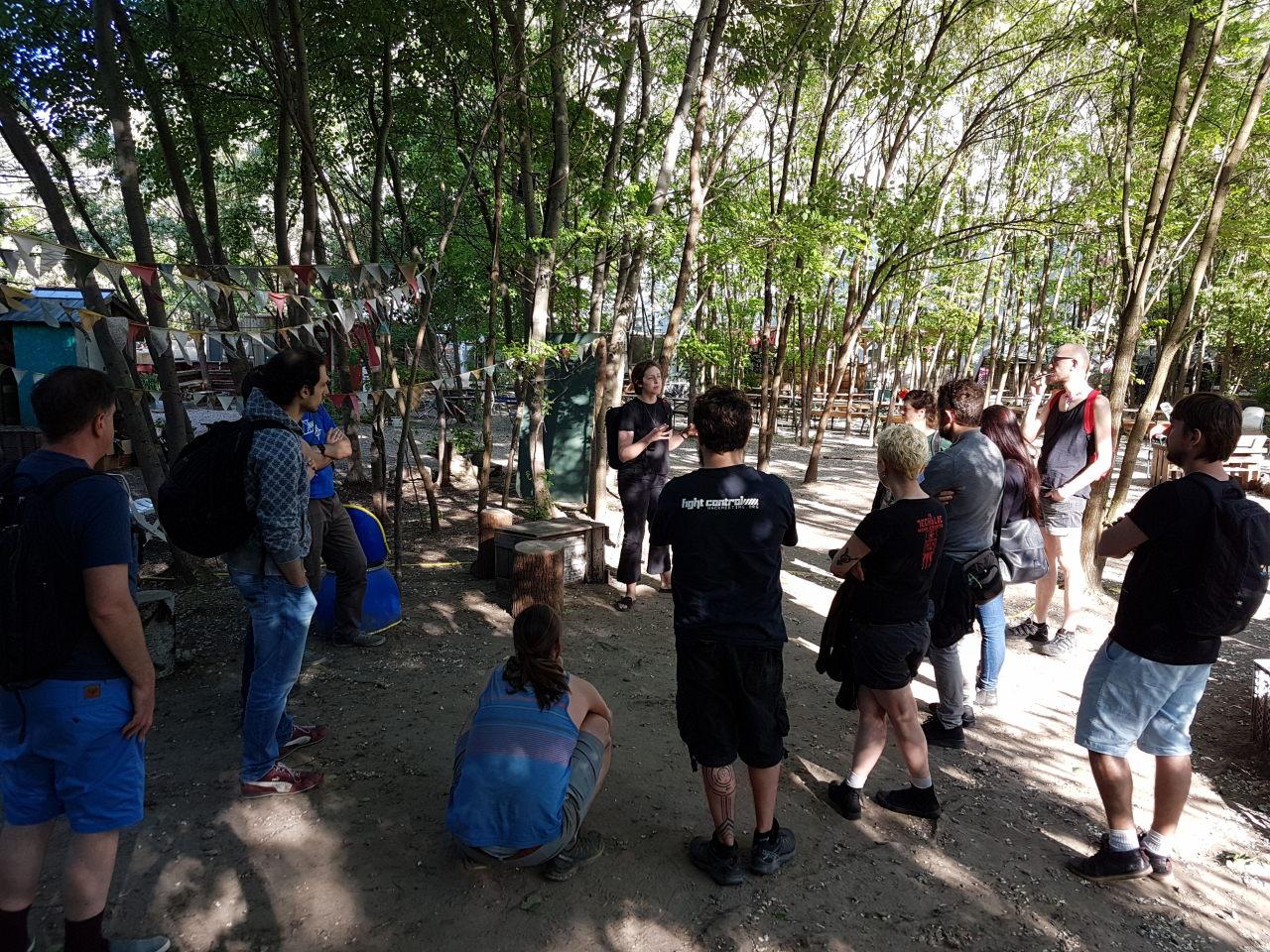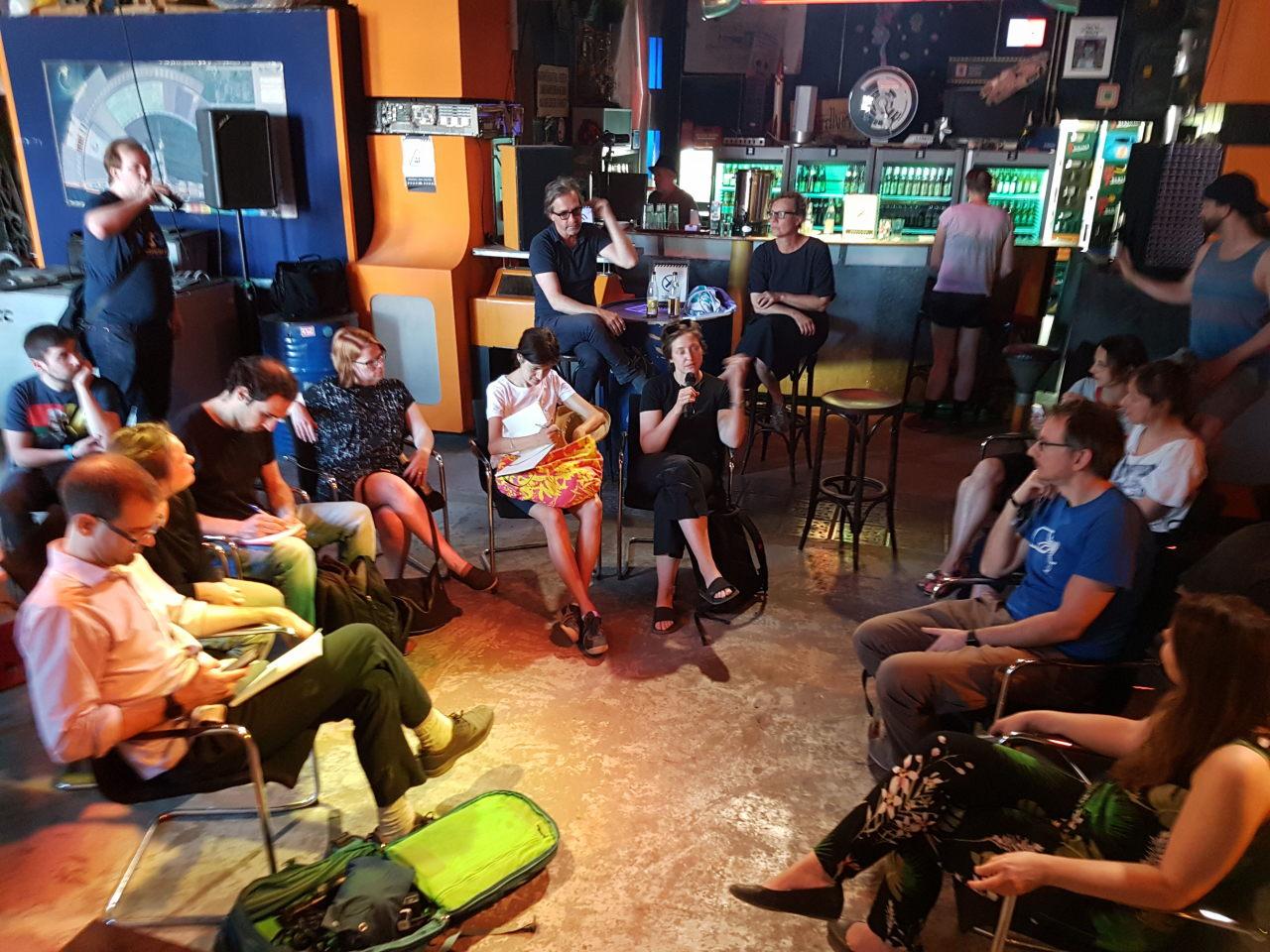Encounters in the hybrid city: Berlin

‘Encounters in the hybrid city’ is an ongoing series of events that started in March 2018, initiating encounters between different activists claiming the rights of citizens in the digital and physical domains. They have much to learn from each other's practices, challenges, and expertise, but also can support each other's agenda through various forms of collaboration.
On May 13, 2018 took place in Berlin one such encounter in the context of the ‘battle of the mesh’, a major event in the Community Networks scene returning in 2018 to the famous C-base, one of the CN scene's birthplace back in the early 2000s.
The Prinzessinnengarten is ten-minutes walk from C-base. It is a key location for the right to the city movement in Berlin, and hosts in a very central node of the city a wide variety of activities and organizations. Its wooden structure "die Laube" is both a symbol and a visible functional space for hosting events and workshops on various topics related to the right to the city movement. Moreover, die Laube is the base of the MAZI project's pilot run by the UdK's Design Research Lab and by the Common Grounds' project Neighbourhood Academy. This made much easier an otherwise very challenging task: to bring urban activists at the C-base and digital activists to the Prinzessinnengarten. Interestingly many of the local actors in these two “activist hubs” have not visited the “other” one.
The presence of the CN community in such an important location for the CN movement, and close to an equally important location for the right to the city movement in Berlin, was very promising. The encounter started at the C-base, at the end of a week long ‘battle of the mesh’ full of events, discussions, and tests. Sunday being the last day the number of people present at the C-base was significantly smaller than the previous days. Only one technical presentation was scheduled for that day, after which the invited guests from the local urban activism scene, around then, entered the main room of C-base.
We introduced this non-conventional workshop with two provocations, one for each side:
- Urban activists will not be able to defend our rights to the city if they don’t include in their claims the right to the digital infrastructures
- Digital activists will end up offering just cheap labour for providing affordable access to the Internet, and more specifically to Facebook, Google, and the like, if they do not address locality in their narrative and do not integrate their efforts with the wider right to the city movement.
A circle was formed in the center of the room, which was joined only by few of the “locals”, the rest staying outside the circle observing the round of introductions. Many interesting urban initiatives were represented like Nachbarschaftsakademie, Stadt von Unten, MetroZones, Mietshaeuserssyndikat, Tesserae, INURA Berlin, Bizim Kiez, Tempelhof Vision, and more. In the beginning it felt like a foreign body entered the C-base and started talking between themselves, including statements by all participants allowing to get to know better each other (e.g., What is the battle of the mesh? What is the prinzessinnengarten? What are the current challenges/tactics of urban and digital activists?).
After the end of the ‘inner’ circle in which only a few digital networking projects were introduced, like Freifunk, La quadrature du Net, and hackerspace Athens, the debate started quickly with many people questioning the dichotomy created by the description of the event, separating the digital with the physical space, and indeed the digital with the urban activists. Jochen from MetroZones gave as example collaborations already from the 1990s Botschaft, Bar + Disco and Katrin proposed that looking at past experiences would help to understand how the movement could be strengthened.

We defended this framing stressing that the only reason for making a distinction between these “inseparable” today spaces (refer to the introductory section of this document) is that in reality many people actually don’t reflect upon their close interrelation, and most importantly, upon the many inspiring analogies and potential complementarities and synergies.
This clarifying intervention broke the ice and people out of the circle started participating and sharing their experiences and possible tactics to defend our rights to the hybrid city. For example, the Mietshaeuser Syndikat is an interesting case study of using existing institutions and laws to create alternatives like various forms of non-speculative, affordable housing, and more specifically to take housing stock “out of the market”.
On the technology side, the important role of a “playing” attitude was highlighted by Adam Burns, the Free2Air’s founder, and netCommons advisor. Adam also highlighted that community is a tricky word and thus it is critical to keep experimenting.From a policy perspective, Virginie from netCommons and La Quadrature du Net highlighted the need to participate also in policy and regulation activities at the EU level but also the national and global. There are many important constraints or openings that could be created by bad or good legislations, respectively.
Then the example of the project genuino clandestino in Bologna, was given for synergies between different forms of resistance, including mesh networking, and also between content, organization and communication within the movement. And the situation in Greece was discussed as an example on how the economic and other crises could become also drivers for resistance and offer opportunities, like the abundance of empty spaces in the city of Athens.
Mary Dellenbaugh-Losse, co-author of “Urban Commons: Moving beyond State and Market”, highlighted the concept of the commons as the 3rd way between the state and the market. She identified as one of the most important finding of hers and others’ research the fact that, in most cases, it is a core group of twenty or even less people running most commons-based initiatives, which are highly depended on them.
At this point was identified the key role of infrastructure as an important common aspect of both domain of action, digital and urban. Interestingly, the idea of the “infinite” digital or “virtual” space was contested as artificial since the energy limitations are important constraint for the digital space that shouldn’t be underestimated. Along these lines, see also JoPP article on the Tupello collective in Genoa.
Actually, many of the urban activists like Konstantin Stergiou have been recently involved in actions against the moving of Google offices in Berlin’s Kreuzberg neighbourhood, “consuming the neighborhood collective product” as someone noted. A very telling manifestation of how the digital and urban rights become more and more interrelated. But what is the alternative to Google someone asked? How can one compete in terms of usability and economies of scale?
Monic Meisel, co-founder of Freifunk and an advocate for local applications in CNs since the early days, admitted that engaging people in using such local applications has proved extremely hard. The examples of austici and framasoft, the french approach the “dégooglisation of the Internet”, creating server coops collectively (self-)managed, but also the MAZI toolkit, were brought as good examples on how technology can help to reduce the barriers to entry.
Thiago Novaes, a political scientist dealing with related digital legal issues, brought the experience from the Amazon, explaining how communities manage to build their own networks with very little resources, and highlighting the fact that it is the process that it is the most important and not the final outcome, the infrastructure by itself.
This part of the discussion was concluded by Ileana from NetHood, proposing to collectively develop and promote a broader perspective on sustainability, through various initiatives and projects, affirming differences and creating a diversity of choices for the livability of the urban system.
The discussion then moved to some ethical dilemmas that activists might face in their effort to engage people in their actions. For example, the use of aggressive advertisement tactics was discussed, with some being in favour seeing it as an only way to compete for attention with the big corporations, and others against, considering that such tactics are not compatible with the values and principles of the movements. Even more controversial was the proposal to use local networks as a means to block access to Facebook and Google. This seemed to be a very sensitive topic for the digital activists that led to a heated discussion about the meaning of Internet freedom, and whether those that jeopardise this freedom should be actively excluded from alternative infrastructures.
After this introductory round, we all walked together toward the Prinzessinnengarten in small groups, some of them already “mixed”, engaging in more informal discussions. For most of the digital activists it was the first time to visit the Prinzessinnengarten and they were offered a guided tour when we arrived. It was interesting to know that one of the principles of the garden is to allow easy access to experimentation by making it “easy” to make mistakes and thus learn, which is one of the main principles of hacking. The need for compromises was also brought to the fore, with the description of the necessary commercial activities developed in the garden that subsidize non-profit project like the Neighbourhood Academy.

During the reception that followed at the wooden construction “Die Laube”, more mixed groups were formed and interesting discussions took place. For example, some urban activists were impressed by the resistance of digital activists to the temptation of “blocking google” from their local networks, something not so obvious in political movements in which the exclusion of “racism”, “violence”, etc is typically tolerated as a defense mechanism.
The pervasiveness of the internet and the rights of some groups to remain disconnected, if they wish so, wasalso brought to the discussion. The resolution was that the strong will of some of the activists to keep tryingand connect the disconnected should be accompanied by instilling values and raising awareness on issues likeprivacy and data manipulation.
P.S. Read the full report on "Community networks and the right to the city" for more hybrid encounters in Heraklion, Greece and Zurich, Switzerland and the concept of the "right to the hybrid city".
P.S.2 At the time of writing of this blog entry there were news that Google cancels its tech campus project in Kreuzberg. See https://www.citylab.com/life/2018/10/google-cancels-tech-campus-kreuzber...


